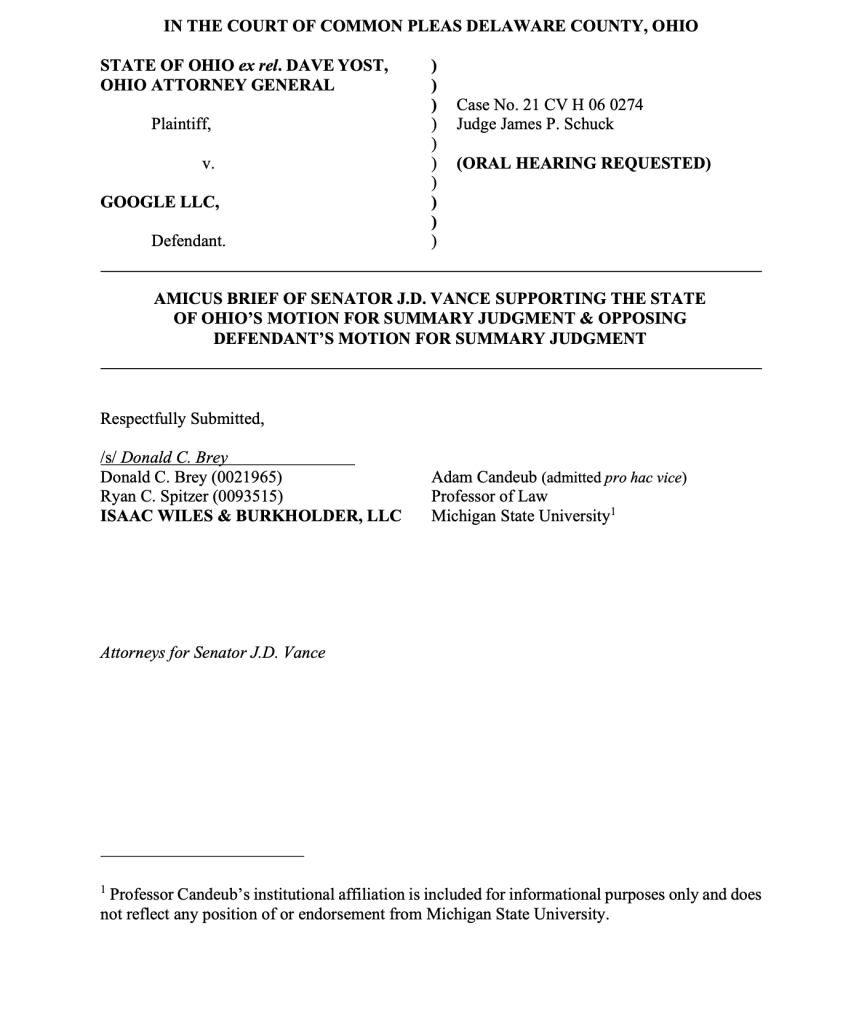“Common carrier regulation is appropriate under Ohio law.”
WASHINGTON, D.C. – Senator JD Vance (R-OH) has filed an amicus brief in support of the State of Ohio’s lawsuit against Google. The lawsuit, filed by Ohio Attorney General Dave Yost, seeks to regulate Google as a common carrier, which will allow the State of Ohio to fight back against Google’s viewpoint discrimination against conservatives.
In his amicus brief, Senator Vance argues Google has taken contrary legal positions in its efforts to defend its monopoly power. In prior cases where Google sought liability protection under Section 230, the company argued it was simply acting as a neutral passthrough for third party content. Yet, in this case, Google now claims it acts as a curator of the data it delivers to consumers through secret algorithms. The amicus brief reads, in part:
Attempting to distinguish itself from its predecessor communications networks, Google argues that it offers “a highly innovative series of connected technologies that answer online user queries. . . . [and] creates a new and bespoke product—a Google search results webpage (“SRP”)—with content of Google’s own creation or selection.” Id. Whether this is true or not— and it is not—Google is playing fast and loose with the facts. Google has claimed the exact opposite about its search service in other cases and before other courts. When seeking to limit its liability for user content under Section 230 of the Communications Act, it has asserted that its search services are “neutral tools,” … that are solely “information provided by another.” …
Indeed, this hypocrisy has led at least one federal judge to conclude it is “a fair point” that Google is judicially estopped from claiming that “the blind operation of ‘neutral tools’” [in its algorithms and other sorting techniques] is actually “editorial discretion.” … In short, Google cannot claim that there are no factual questions about whether its services are susceptible to common carrier regulation suitable for resolution at this stage of litigation—because at the very least, this Court must determine which version of the facts about search engines Google actually asserts.
But even accepting as true its representations to this Court about how its search functions, they do not undermine the finding that Google search simply carries other people’s information, connecting people to websites. Instead of telephone numbers, Google may use a host of algorithmic indexing techniques to create a search results webpage (“SRP”). But its functions are essentially the same as any communications network: it connects people by transmitting their words and exchanging their messages. It functions just like an old telephone switchboard, but rather than connect people with cables and electromagnetic circuits, Google uses indices created through data analysis. As such, common carrier regulation is appropriate under Ohio law.
Read Senator Vance’s full amicus brief here or by clicking below. Read more from Breitbart here.

###

